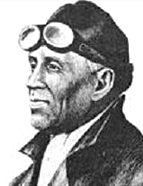

Note was taken of his irreverence when he decided not to accept the Catholic Church’s dogmatic position: “(…) I began to disagree with confession and other Catholic things. I became a free thinker, but I am a Christian complying with his fair moral principles.” (Precursor da Navegação Aérea, 1969, p. 5). Politically he sought to be independent, albeit he had been a convinced adherent to the republican cause – a conviction that only lasted until 1914, because according to him: “The politicians who counselled the kings failed. After the revolutions of the Republic, which also proved the failure of their men, I began thinking it would be preferable to have a constitutional monarchical regime, like the British one... but more socialist than labourite. The latter is breaking England, and if Queen Victoria were to come back to this world, she would immediately escape to another one …”. (Precursor da Navegação Aérea, 1969, pp. 5-6). He also said: (…) “that the regimes and the parties changed, but the men were the same or persisted in the same mistakes” (Um talento invulgar e multiforme, 1969, p. 164).
When the republican regime was installed, Gago Coutinho was “asked” to a sign a declaration that was worded as follows: “I declare on my honour that I will guarantee the most absolute loyalty to the new regime of the Republic that is currently in force in Portugal.” Not satisfied with a mere signature, he wrote: “I have always served Country, and have never declared or considered myself to be serving the King – I thus declare on my honour that I will continue serving the Country, whatever the political format – monarchical, republican or socialist – the Country may choose. I reserve myself for more explicit declarations, but I always agree with my former and current form of action, in Lisbon in the hands of the Minister. Lourenço Marques, 4 November 1910 Gago Coutinho Naval Captain” (Historical Archive of the Central Navy Library [ACM], Sundry Documentation: Republic – Adherences to the republican regime. 1910, Box 1244).
Given Gago Coutinho’s enormous popularity, Raul Proença and the Seara Nova group proposed that he stand for President of the Republic in an article entitled “A República e o Exército” (The Republic and the Army). In it, they expressed their “concern about the question of the government’s competence:(…) ‘an authentic national government of competencies, presided over by a figure with great prestige who could count on the support of all the Portuguese’, and who could be Admiral Gago Coutinho, inasmuch as ‘only a man of exceptional quality will be able to restore peace within the Portuguese family’ and restore order in the Armed Forces. This appeal went unheeded and did not garner any support.” (Raul Proença, 2003, pp. 478-479). On 10 December 1925, when Manuel Teixeira Gomes left office, there were those who considered electing Gago Coutinho by plebiscite.
